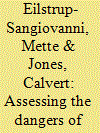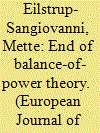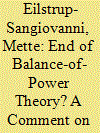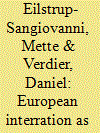|
|
|
Sort Order |
|
|
|
Items / Page
|
|
|
|
|
|
|
| Srl | Item |
| 1 |
ID:
083701


|
|
|
|
|
| Publication |
2008.
|
| Summary/Abstract |
Theoretical work on networked organization informs a large swathe of the current literature on international organized crime and terrorism in the field of international relations. Clandestine networks are portrayed as large, fluid, mobile, highly adaptable, and resilient. Many analysts have concluded that this makes them difficult for more stable, hierarchical states to combat. The prevailing mood of pessimism about the ability of states to combat illicit networks, however, may be premature. International relations scholars working in the area have often been too quick to draw parallels to the world of the firm, where networked organization has proven well adapted to the fast-moving global marketplace. They have consequently overlooked not only issues of community and trust but also problems of distance, coordination, and security, which may pose serious organizational difficulties for networks in general and for illicit networks in particular. Closer attention to a wider body of historical and contemporary research on dynamics of participation in underground movements, the life cycle of terrorism and insurgency, and vulnerabilities in organized crime reveals that clandestine networks are often not as adaptable or resilient as they are made out to be. An analysis of the al-Qaida network suggests that as al-Qaida adopts a more networked organization, it becomes exposed to a gamut of organizational dilemmas that threatens to reduce its unity, cohesion, and ability to act collectively.
|
|
|
|
|
|
|
|
|
|
|
|
|
|
|
|
| 2 |
ID:
078604


|
|
|
|
|
| Publication |
Hampshire, Palgrave Macmillan, 2006.
|
| Description |
x, 511p.
|
| Standard Number |
1403941033
|
|
|
|
|
|
|
|
|
|
|
|
Copies: C:1/I:0,R:0,Q:0
Circulation
| Accession# | Call# | Current Location | Status | Policy | Location |
| 052561 | 341.2422/EIL 052561 | Main | On Shelf | General | |
|
|
|
|
| 3 |
ID:
090273


|
|
|
|
|
| Publication |
2009.
|
| Summary/Abstract |
The balance of power is one of the oldest and most venerable concepts in the study of International Relations. Few concepts have had a comparable influence on both scholarship and statesmanship, and few have been so fiercely contested. In a recent article, `Testing Balance-of-Power Theory in World History' (EJIR, June 2007), Wohlforth et al. set out to test balance-of-power theory against 2000 years of world history. Although their article has considerable merits, I highlight three main weaknesses in their approach. First, I argue that they misstate balance-of-power theory. Second, the competing theoretical hypotheses they offer are (a) not novel, (b) too vague to enable productive empirical testing. Third, the historical evidence they present, based on the study of ancient international systems, is too scant and impressionistic to be probative for the causal mechanisms they seek to evaluate. As a result, balance-of-power theory is neither refuted nor significantly refined.
|
|
|
|
|
|
|
|
|
|
|
|
|
|
|
|
| 4 |
ID:
088561


|
|
|
|
|
| Publication |
2009.
|
| Summary/Abstract |
The balance of power is one of the oldest and most venerable concepts in the study of International Relations. Few concepts have had a comparable influence on both scholarship and statesmanship, and few have been so fiercely contested. In a recent article, `Testing Balance-of-Power Theory in World History' (EJIR, June 2007), Wohlforth et al. set out to test balance-of-power theory against 2000 years of world history. Although their article has considerable merits, I highlight three main weaknesses in their approach. First, I argue that they misstate balance-of-power theory. Second, the competing theoretical hypotheses they offer are (a) not novel, (b) too vague to enable productive empirical testing. Third, the historical evidence they present, based on the study of ancient international systems, is too scant and impressionistic to be probative for the causal mechanisms they seek to evaluate. As a result, balance-of-power theory is neither refuted nor significantly refined.
|
|
|
|
|
|
|
|
|
|
|
|
|
|
|
|
| 5 |
ID:
178292


|
|
|
|
|
| Summary/Abstract |
Scholars have studied international NGOs as advocates and service providers, but have neglected their importance in autonomously enforcing international law. We have two basic aims: first to establish the nature and significance of transnational NGO enforcement, and second to explore the factors behind its rise. NGO enforcement comprises a spectrum of practices, from indirect (e.g., monitoring and investigation), to direct enforcement (e.g., prosecution and interdiction). We explain NGO enforcement by an increased demand for the enforcement of international law, and factors that have lowered the cost of supply for non-state enforcement. Increased demand for enforcement reflects the growing gap between the increased legalization of international politics and states’ limited enforcement capacity. On the supply side, the diffusion of new technologies and greater access to new legal remedies facilitate increased non-state enforcement. We evidence these claims via case studies from the environmental and anti-corruption sectors.
|
|
|
|
|
|
|
|
|
|
|
|
|
|
|
|
| 6 |
ID:
061236


|
|
|
|
|
|
|
|